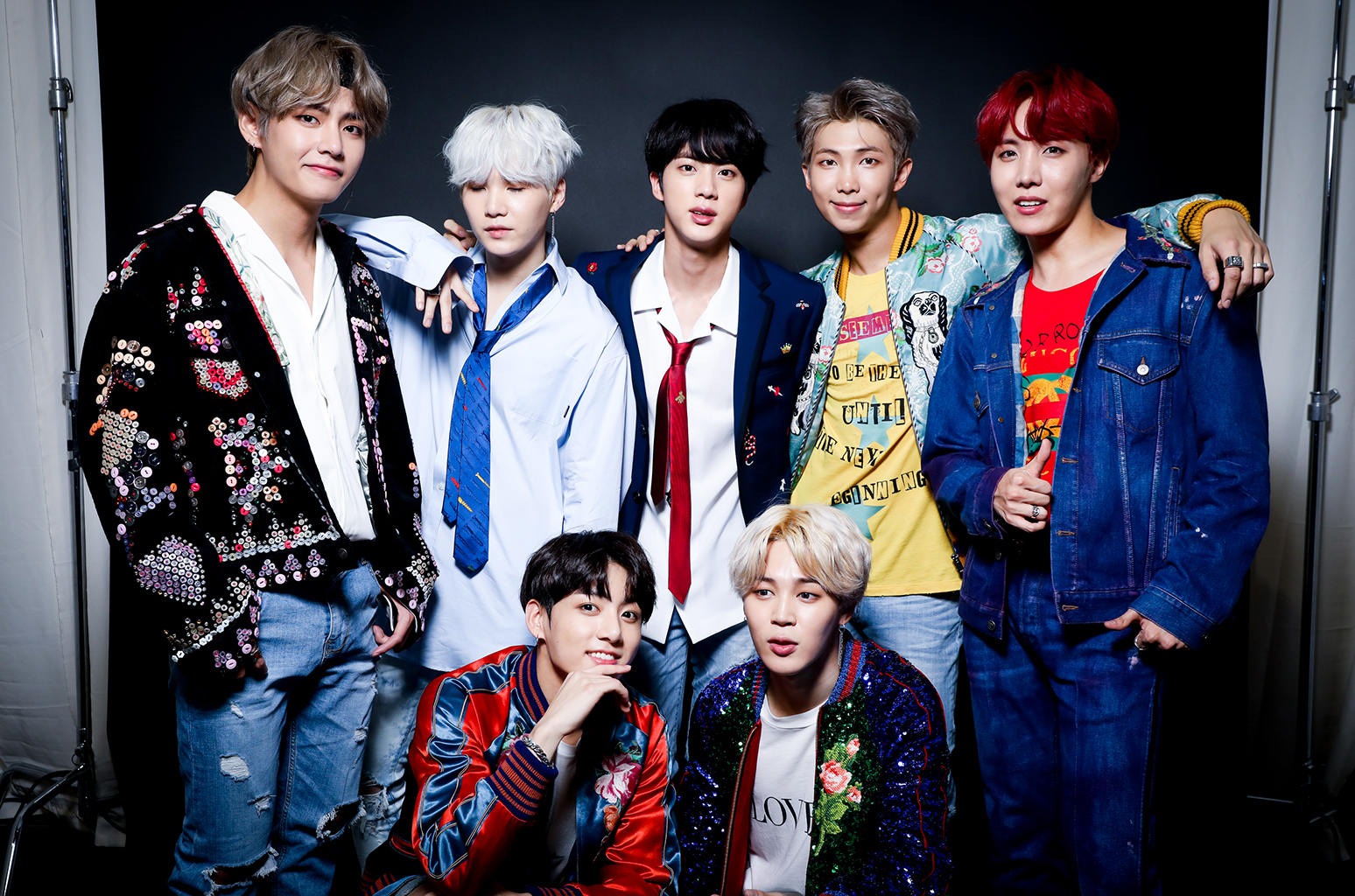Only around one year ago, K-pop group BTS broke into the American music scene with the force of thousands of fans behind them. Their nomination and later win for top social artist at the 2017 Billboard Music Awards (BBMA) put them on the mainstream map for the first time, and they have only risen in popularity since.
Later that year, BTS performed at the American Music Awards, making their U.S. television debut. Their following press tour included appearances on “The Ellen DeGeneres Show,” “The Late Late Show with James Corden” and “Jimmy Kimmel Live,” in addition to various other interviews.
And to top it all off, BTS’s re-nomination for top social artist at this year’s BBMA’s also accompanied an announcement of their performing there as well.
As their YouTube Red show airs every week and anticipation builds for a new album release in May, the seven boys of BTS sure have a lot on their plate. Needless to say, the entire world is anticipating what BTS will do next, and everyone is eager to see how they will eliminate more barriers to entry for the American music industry along the way.
But the irony of the whole situation lies in one simple fact: BTS never intended to break into the American market. Like most K-pop groups, BTS expected to gain a following primarily within their home country, perhaps with some Japanese song releases thrown in. Yet everyone in the world is wondering about how BTS accomplished something as difficult as winning a Billboard Award without ever promoting themselves in America.
Such success has manifested itself as the product of a subtle butterfly effect that even the most dedicated of analysts struggle to explain. BTS are stellar performers with significant musical talent, but so are plenty of other groups.
As much as people like to define BTS by something as simple as their dance moves, you can’t pin their success down to one factor. Though the justification behind the BTS craze isn’t a straightforward one, the heart of the issue lies with timing, marketing and relatablity.
People who are looking from the outside in must think that BTS’s ascension seems completely random since Korean music has never truly thrived within the American mainstream before. Aside from the cultural phenomenon “Gangnam Style,” several Korean artists have tried making American debuts, but to no avail.
Big names in K-pop such as BoA, Wonder Girls, Rain, Girls’ Generation and, most recently, CL have all tried and failed to make an impact upon the Western public. The artists listed above all tried their best to appeal to Americans with English music releases, but the thing they were lacking was timing.
BTS debuted in June 2013, an unexpectedly crucial period for K-pop within the English-speaking Internet. The “Gangnam Style” hype had begun to die down, but social media use among the general public had been slowly but steadily building. And because BTS created their social media accounts at such a critical juncture (their Twitter being made in 2011 and YouTube channel in 2012), they gleaned more fans as a result.
Overall, much of the attention they received came to them as a result of generally increasing social media consumption over the past five years or so. In other words, BTS was in the right industry at the right place at the right time. BTS happened to debut at a point where general awareness of K-pop was rising due to “Gangnam Style,” yet they did not face too much competition by debuting as early as they did.
Unlike many other Korean artists at the time, BTS heavily relied on using YouTube and Twitter to promote themselves online, from their humble beginnings to today’s success. This method contradicted the norms of the industry since K-pop idols typically use Korean news channels and TV shows to make a name for themselves.
However, BTS came from a small company with few resources to their name, making it difficult to find opportunities in a media sphere that has been dominated by a select few companies for so long.
Essentially, BTS had better luck doing their own thing online rather than using Korean media channels to promote themselves. Admittedly, they weren’t the only celebrities who joined in on this trend, but BTS did put a fresh spin on how K-pop stars portray themselves online.
In terms of social media, BTS took a much more informal approach with their posts compared to other Korean artists. For example, this Tweet from the Girls’ Generation official account that advertises a fan meeting event says a lot about a typical K-pop group’s Twitter; the collective Twitter account is run by a company executive for promotional purposes, and more personal posts are reserved for individual members’ accounts.
‘YOONA FANMEETING TOUR, So Wonderful Day #Story_1’이 5월 서울 시작으로 아시아 주요 도시 개최됩니다👏
✔서울 팬미팅
📆 일자: 2018.05.20 6PM KST
📍 장소: 세종대학교 대양홀
🎫 티켓 예매: 2018.04.26 8PM KST 예스24#GirlsGeneration #YOONA #윤아 #SoWonderfulDay_Story_1 pic.twitter.com/Y85FfoQ3mK— Girls' Generation (@GirlsGeneration) April 23, 2018
Though this trend does seem to make sense, BTS contradicts such a norm with their social media, as they have one collective, personal Twitter account for the seven members. The members began posting on this account even before their debut, allowing fans to truly become invested in them from the very beginning.
Because BTS uses this shared-account format, fans have a single place where they can find entertaining content about their favorite group. For instance, member Jin recently Tweeted a fan-edited photo of his screaming face on the painting, “The Scream,” much to people’s amusement.
Member RM also has a regular series of Tweets called “Kim Daily,” a title that uses RM’s surname Kim to show off his daily fashion. From your everyday selfie to funny photos of a member during his birthday, the BTS Twitter account is full of surprises. And although the majority of the Tweets are in Korean, the fans still eat it up.
😂😂👍 #김데일리 pic.twitter.com/giRvwJHsqO
— 방탄소년단 (@BTS_twt) April 11, 2018
BTS’s brand of utilizing casual, behind-the-scenes posts serve as a foil for the carefully crafted image of a typical K-pop star; but after BTS proved their social media approach to be effective, you can bet that almost any K-pop group worth their salt today will have similar bonus content on their Twitter, Instagram and YouTube.
BTS has utilized Internet-influencer-level social media activities to turn their professional, onstage personas into something more relatable, though they probably did so without even realizing it themselves.
Having said all that, you’re probably wondering what BTS’s social media success means for foreign artists in general, right? Well, the answer is both simple and complicated: developing a fandom is key.
Social media became a more powerful tool than anyone expected, and BTS used this tool to gain exposure. See, you can be the most talented dancer, singer, rapper or producer in the world, but you still have to get people to care about you in order to have your work seen.
After people start having a reason to watch what you do, that’s when you gain a following. Even if you sing in a language that isn’t shared by your fans, they’ll still sing along as long as it’s you they’re singing with.
Perhaps this necessity for a following explains why Spanish songs such as “Despacito” and “Bailando” gained popularity in the U.S., yet very few Spanish speaking artists have maintained a consistent American fandom.
Those artists may have had hit songs, but they lacked the ease of connection BTS has to their fans. And even for the success stories such as Shakira, she must compromise by releasing English music in conjunction with Spanish music to appeal more widely.
Meanwhile, BTS has historically been dubious about releasing an English album. BTS’s agency CEO Bang Shi Hyuk had this to say about releasing English music: “There’s no rule that they [BTS] have to use English. Even though they sing in Korean, foreign fans like it.”
So, will BTS’s appearing at the Billboard Music Awards again this year have social repercussions for other foreign artists in general? Well, only time will tell. Though BTS does seem like an exceptional case given their circumstances, they do set a precedent for how to bridge a language gap between fans and an artist.
In the future, perhaps other artists follow BTS’s path to the American mainstream, but it may not happen in the near future. Connecting with millions of people across oceans in a foreign language takes a rare breed of person, after all. If someone new is up to the task, the world is eager to see what they’ll have to offer.
















